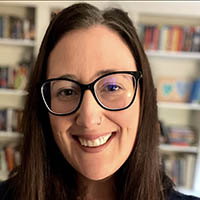Students produce podcast series in clinical practice class
Cassie DeSena-Jacobs’ twist on a traditional course at the VCU School of Social Work in Spring 2022 let M.S.W. students go beyond written assignments and extend the reach and value of the work they produced.

DeSena-Jacobs, D.S.W., LCSW, turned her SLWK 705 - Clinical Social Work Practice II class into a semester-long assignment called the Hybrid Technology Project, with the ultimate goal of students producing a series of podcasts. She also had another motivation for the change of pace, which featured face-to-face classes as well as six hybrid classes focused on the podcast production.
“The hybrid approach was utilized because many students feel emotionally drained by the end of the last semester of graduate school,” says Dr. DeSena-Jacobs, a former community-embedded (adjunct) faculty member who joined the school as a full-time assistant professor in teaching in mid-semester Spring 2022.
“I wanted to identify a way for students to present what they have learned and are passionate about in a way that was not a written paper,” she says. “The second reason was that a podcast approach allowed students to share their clinical passions and interests with individuals outside of their professor.”
This kind of creative project is, in my opinion, what education should be, especially at the master’s level. ... By doing this project, we are promoting accessibility to mental health information in a way that is easy to understand.
The podcasts ranged from juvenile justice work through a restorative lens to working with LGBTQ clients with gender-affirming therapy models. Three focused on Trauma-Focused Cognitive Behavioral Therapy (TF-CBT). The result was nine separate podcasts.
“The purpose was to help students learn about assessment, evaluation and intervention skills while learning about technology tools and resources in the form of a podcast,” Dr. DeSena-Jacobs says. “The goal was to identify ways to integrate clinical and technical skills into social practice.”
Nineteen students worked in pairs or trios and identified a clinical modality. After identifying the modality, they spent the semester researching, finding experts to speak on the podcast and eventually recording podcast episodes.
Dr. DeSena-Jacobs says that while the project was initially daunting, students enjoyed the opportunities to find and interview subject matter experts and to learn to record and edit a podcast rather than writing a paper.
“This kind of creative project is, in my opinion, what education should be, especially at the master’s level,” says one of the participating students, Sarah Nieburg, who graduated in May with her M.S.W. and now works as a clinician with Richmond Behavioral Health Authority. “The social work career is one that requires a level of creative thinking and teaching to our clients and learning from each other. This podcast project reflected that and allowed for us (the students) to take control of our learning and let us go beyond classroom material.
“I am very much a tactile and auditory learner," Nieburg continued. "I think I was able to teach myself so much more in depth about TF-CBT by being able to explain and talk through it with someone else in a podcast setting in order to reach other audiences. It helped me conceptualize the therapeutic method because I was able to put it into my own words. This not only taught me about TF-CBT but it was an invaluable way to practice explaining the concept to clients and non-mental health professionals.
“My other great takeaway from this: Podcasts and radio mediums are so underrated because they are tools of information that can be used by anyone despite a person's privileges or abilities. … You don't need a higher education degree or even the ability to read, in order to listen and learn. By doing this project, we are promoting accessibility to mental health information in a way that is easy to understand.”
Dr. DeSena-Jacobs plans to offer the Hybrid Technology Project again in Spring 2023.
“I hope to be able to continue to hold this class, continuing to share these incredible student podcasts within VCU and to whoever wants to listen!” she says.
- Hope and Resilience: What Parents of Children on the Autism Spectrum and Clinicians Can Offer to Maintain Both
- Trauma and Psychodynamic Therapy
- Talking about TF-CBT with Kara, Sarah & Brittany
- Object Relations and Sensorimotor Work with Trauma
- Clinician's Corner: TF-CBT
- Juvenile Justice System and TF-CBT
- Juvenile Justice and Restorative Practices
- Student Therapy Huddle
- The Gender Affirming Therapy Podcast
Students who participated:
- Mary (MK) Anderson
- Andrew Bako
- Katelyn Bond
- Brad Carney
- Brittany Clark
- Katie Culbertson
- Jason Gray
- Lauren Hudgins
- Summer Jones
- Kasey Louis
- Amber Murphy
- Sarah Nieburg
- Kayla Pratcher
- Kara Purdue
- Jennifer K. Ramachandran
- Emma Rutstein
- Tori Talbert
- Abby Villanueva
- Isabel Wilson
Alumni who participated as interviewees:
- Rebecca Ricardo (M.S.W.’89/SW), LCSW
- Elizabeth Timmons (M.S.W.’16/SW), LCSW
- Kristi Vera (M.S.W.’97/SW), LCSW
- Julia von Briesen (B.A.’05/H&S; M.S.W.’19/SW; M.P.H.’19/M)
- Lisa Wright (M.S.W.’93/SW), LCSW, RPT-S